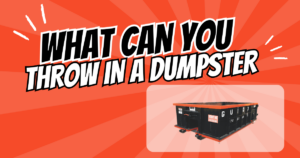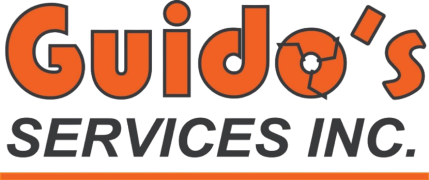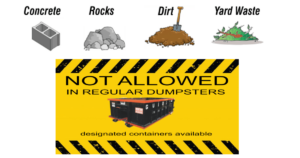What Can You Throw in a Dumpster? Understanding What’s Allowed and How to Properly Dispose of the Rest
Throw in a Dumpster? Understanding What’s Allowed and How to Properly Dispose of the Rest
Renting a dumpster is one of the simplest solutions for disposing of household junk, construction debris, and remodeling waste. However, not everything is allowed in a dumpster. Some items are restricted due to safety, environmental concerns, or local regulations. This guide outlines what you can and cannot throw in a dumpster and provides tips on how to properly dispose of prohibited items.
Items You Should NOT Throw in a Dumpster
Certain materials are strictly prohibited from being thrown in a dumpster. These items often contain hazardous chemicals, pose safety risks, or could damage the dumpster itself. Here’s a breakdown of what’s not allowed and how to manage their disposal:
1. Aerosol Cans
- Allowed: Empty aerosol cans.
- Prohibited: Full or partially full aerosol cans. They pose an explosion risk. Instead, take them to a local hazardous waste disposal facility.
2. Car Batteries
- Prohibited: Car batteries, including lithium batteries, are not allowed because they contain toxic chemicals. Recycle them at designated locations like auto shops, recycling centers, or electronics stores.
3. Hazardous Materials
- Prohibited: Hazardous items such as asbestos, pesticides, contaminated soils, motor oil, and medical waste. Disposal requirements for these materials vary by state, so be sure to check your local guidelines for safe disposal options.
4. Mattresses
- Prohibited: Mattresses are banned from dumpster disposal in Massachusetts due to recycling laws. If you place a mattress in a dumpster, you could face additional fees—typically around $125 per mattress. Refer to the Massachusetts mattress ban recycling guide for more information.
5. Oils, Fuels, and Propane Tanks
- Prohibited: Flammable substances like propane, fuel, and oil are hazardous and illegal to dispose of in dumpsters. Contact your local propane company, fire department, or hazardous material collection center for proper disposal.
6. Refrigerators
- Prohibited: Due to toxic refrigerants, refrigerators generally cannot be thrown in dumpsters. Proper disposal often requires a professional to evacuate refrigerants, and there is typically a $125 disposal fee per refrigerator.
7. Food Waste
- Prohibited: Food waste (large amounts) can attract pests and cause foul odors, so it’s not allowed in dumpsters. Consider using municipal trash services or composting centers for large amounts of food waste.
8. Household Cleaners
- Allowed: Empty cleaner containers.
- Prohibited: Any containers with leftover chemicals should be disposed of according to hazardous waste regulations.
9. Paint Cans and Lacquers
- Prohibited: Paint, thinners, lacquers, and stains. However, latex paint can be dried out and disposed of in some areas. Empty or completely dried paint may be disposed. Consider using paint hardeners available at stores like Home Depot to speed up the drying process.
10. Railroad Ties
- Prohibited: Treated railroad ties contain chemicals that can be harmful. However, some landfills may accept them, or you might consider donating them for reuse.
11. Tires
- Prohibited: Tires are not accepted in dumpsters as they are prohibited from most landfills. You can usually dispose of them at auto shops or through local municipalities, often with a disposal fee starting at $25 per tire.
12. Yard Waste
- Prohibited: Cannot be mixed with other debris. Designated dumpsters available. Please reach out to the office for more information 978-230-3883
- Allowed: Yard waste is permitted in designated dumpsters and in small quantities, as long as it constitutes less than 10% of the load. If you have any questions about acceptable amounts or types of yard waste.
13. Furniture
- Allowed: Wooden furniture is typically accepted.
- Prohibited: Upholstered furniture may not be allowed in all areas, and extra fees could apply depending on local regulations.
14. Electronics
- Prohibited: Electronics, particularly larger items like CRT TVs, are usually not allowed. Where e-waste recycling is required, fees can range from $70 to $125 per item.
15. Appliances, Washer and Dryer
- Allowed: Most smaller appliances, such as microwaves and dishwashers.
- Prohibited: Larger appliances like washer, dryer and refrigerators require special disposal, often with fees between $70 to $150.
16. Air Conditioners (AC Units)
- Prohibited: Due to environmental regulations in Massachusetts, air conditioners are prohibited in landfills. Disposing of them requires specialized handling, and a $125 surcharge per unit applies.
17. Brick, Asphalt, Concrete, Stumps
- Allowed: Heavy materials can be disposed of in dumpsters specifically designed for each such debris. Solid material still cannot be mixed. Contact us for pricing, and more information in your area. 978-230-3883
If you are ever unsure about an item and whether it can go into a dumpster, feel free to contact us at 978-230-3883. We’re here to help with all your dumpster rental and waste disposal needs!

